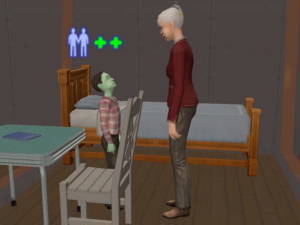Sunday 2 October 2005

|
Pic of the day: The baby boomers are likely to live on, although they may find themselves in a slightly alien world, like most old folks do. (Screenshot from The Sims 2.) Two gray wavesYes, it is true that the baby boomers are going to retire soon. But it is still a long time before we need to be concerned about changing their diapers. All over the developed world, economists are fretting over the "gray wave". The children born just after the second World War were not just unusually many in numbers, they were also the last big wave of children in the developed world. Since then, the number of children has fallen below replacement levels in Japan and Europe, while the USA is still slowly growing thanks to immigration and the children of immigrants. (Of course, almost all Americans are children of immigrants in the recent past.) In East Asia, the baby boom culminated decades later than in Europe, while in some developing countries it has just ended. (And in a few, dirt poor countries, people are still having as many children as they can to make up for the horrible death rates. But that's another and sadder story.) The successful society we are used to is based on a certain balance between the age groups. This balance has been upset and is about to be further upset. Naturally economists are upset too, because their models predict that there will be lot of retired leechers riding on the back of fewer taxpayers, many of which are going to be working with health care for the elderly anyway rather than converting raw materials into luxury goods for us. When all these baby boomers grow old and need help with everything, who is going to pay for that? ***Well, there are two distinct problems here. Remember that the people you remember as old were your grandparents, or parents if you are my age. They were born during the first World War and lived through the Great Depression. They had poor nutrition, little schooling, and mostly manual labor. The average intelligence at that time would be classified as mild retardation today. All of this is important. Because the baby boomers who retire during the next five to ten years are not old. They may retire, but not because they are tired. Perhaps they will finally admit that they are not young anymore, but it is not bad health that drives most of them out of the workforce. (Those who had health problems are mostly out already.) They may be on the chubby side, most of them, but are otherwise quite well conserved. First off, not all of them are going to retire at 65. Those who have interesting jobs will stay in them. There is already legislation against age discrimination in some states, and more is likely to come. Besides, some of the jobs are not easily filled. If people have knowledge and skills that are in high demand, they are likely to work part time even after they are officially retired. After all, these people worked overtime while still in a full job. And no matter how you look at it, a pension is likely to be less than a full salary. Noticeably less. Getting money for nothing is certified cool, but you do have less money to spend. If getting a part time job is easy and they can still get their pension too, you bet they will do it. ***Contrary to what you might believe from all the whining, elderly people today have less chronic disabilities than a generation ago. Much less. An 80 year old today has the health of a 70 year old of the previous generation. Of course, eventually they will be 90. But for the baby boomers, that is pretty far off. They are 60 now. That's 30 good years for most of them. The world will be changed beyond recognition by then. Most notably, Alzheimer's disease - the leading and almost only cause of age-related dementia - is now treatable. The treatments are still in trial as far as I know, and there is still the tricky part of diagnosing it in time. But widespread screening and prevention is likely to be no more than ten years away, which means there is a good chance that most baby boomers will keep their brains until they die somewhere in the age of 90-105. This greatly reduces the need for special care. They may still need help in the house, but Japanese house robots are now reaching marketable state (not just prototype anymore). Within 20 years "intelligent homes" and robots should allow many baby boomers to stay home until their final hospitalization. It is hard to exaggerate the impact of Alzheimer's on the health of the elderly. Once you pass a critical level of mindfulness, you are no longer able to take you medication for other illnesses. Overmedication is as much of a problem as undermedication. You start doing reckless things and take physical damage. Your social networks break down. Your pets die or run away. If we can stop Alzheimer's at an early stage, the life quality rises dramatically and the elderly can contribute to society rather than drain it of resources. This time is drawing near: The dawn of the Power Elder, so to speak. Sure, they will fail and die eventually. But it could be a long and beautiful sunset. |
Yesterday <-- This month --> Tomorrow?